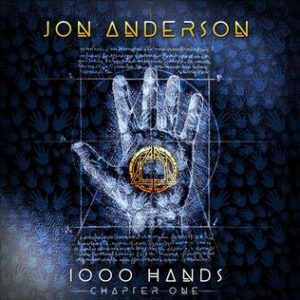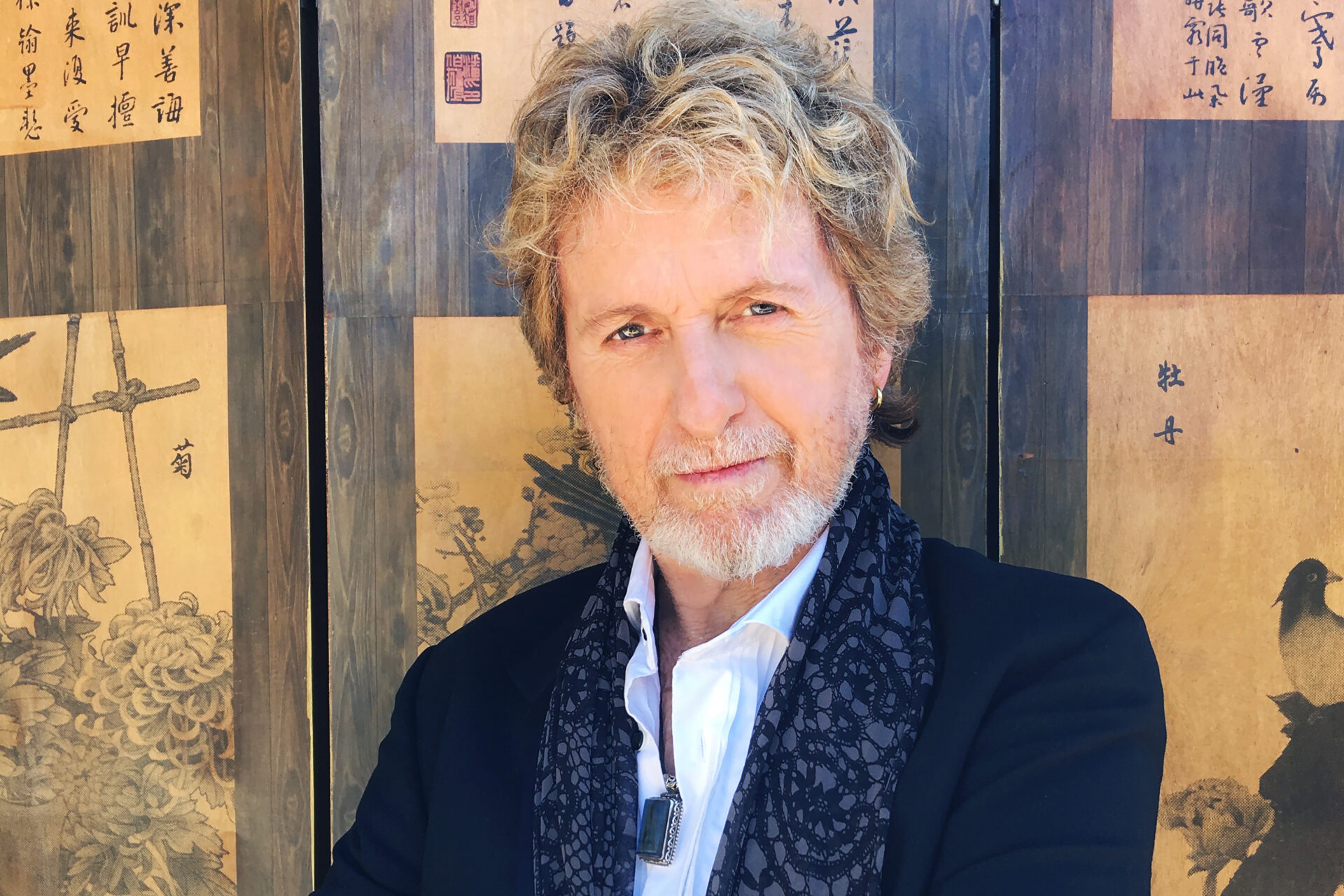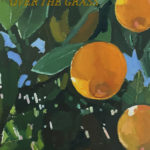Jon Anderson, to most folk, is a Godfather of prog music, for his work as founder member of that genre’s pioneering group Yes. But he’s much more than that. He made pop music with a classical bent during his decade or so with Greek synth hero Vangelis, and has released several splendid, diverse albums under his own name. He’s also a humanist, a would-be football legend, and an all round good egg. I had a Zoom conversation with him last week about his excellent new album, 1000 Hands, his career in general, and was educated about the origin of words along the way! This was the resulting interview.
God Is In The TV: How are you coping with the lockdown, Jon?
Jon Anderson: Very good actually, because I was able to concentrate on finishing the large scale epic that I started last year. I’ve spent three months on that. It’s not finished completely – you can listen to the music because I did that last year in the space of one week. If you search for Jon Anderson‘s Joyfulness, it’ll come up on YouTube. It’s four movements, but then I decided that I liked the idea so much that maybe I should write songs and lyrics all the way through the whole thing. So it’s four 19 minute pieces. For me it’s become my focus for the next year. I still want to add choral and orchestra to it along the way. So I let go of that last week, and now I’m on to my major work, which is something I’ve been working on for 15 years. It’s driving me crazy!
Wow. And that’s only half as long as you’ve been working on 1000 Hands!
JA: Oh yeah, 1000 Hands, 30 years, you know!
What struck me the most about 1000 Hands is just how uplifting it is. We’re living in quite dark times right now so it seems like the perfect time to put it out. How much did lockdown influence your decision to re-release it, in that respect?
JA: Well, first of all we had to find a record company that was interested. We got turned down by the top record companies, then we found this kind of ’boutique’ record company in Los Angeles, which is run by a guy who’s very smart and loves music. He loved the album, so we said “Well, why don’t you release it then?” which he was very happy about. And like anything really, we just want people to hear what we do. As you know, my history in music is very diverse, on so many levels, and I was always hoping that people would be able to listen to it, without having to listen to it on the radio. Because the radio is this very fine channel…
Oh, definitely. Even more so now than ever, I would suggest.
JA: Yeah. Well, I say that, but I was part of the opening of XM Radio with Lee Abrams, who is this really famous guy over here in America, and we’ve been friends for years and years. He’s a big Yes fan and he became an executive in radio. He was guy who changed FM to AM in the mid-seventies, right when we finished Close To The Edge. We’d been on tour and we went to these colleges around America. There was a radio station in each college – this is when we were doing the Fragile tour, and they would play ‘Roundabout‘ all the way through, or ‘Starship Trooper‘ all the way through, or ‘Heart Of Sunrise‘ – all these eight or nine minute pieces in full, and I thought “At last! We have connection with the radios!” They were actually starting to understand what this band of musicians was trying to do – we weren’t going to just try for 3 minutes and 33 seconds pop songs. Which is fine, if that’s what you want to do, of course. But I didn’t want to do that with these really talented people, and as it happened, at that moment in time, the radio stations across America in the FM weren’t making any money because they really didn’t get much revenue from advertising, so the powers that be decided to go back to AM. So you got 40 songs over two hours, and they’d keep playing them every two hours. And that’s the way life happens. But I carried on with the idea of presenting to an audience like… you know… we were able to keep an audience focused for 10, 15, sometimes even 20 minutes long for one song. Just listening to the band, and it was something new, in a way.
And you’ve worked with a lot of heavyweight musicians over the years, especially on THIS album. It’s nothing short of astonishing, the names you have on 1000 Hands…
JA: Yeah. It took on a life of its own! As you know I started it in Big Bear, in the mountains here at LA. I did some recordings and then went down to LA because Chris (Squire) and Alan (White) were there, so I got them to play on two tracks, and I started thinking “Oh, I could get The Beach Boys to sing on it, and get Wayne Shorter, and Billy Cobham…” and all these names popped up in my head, so I wrote them all down…. and then life… just carries on. I was working with my friend Brian Chatton, who was in the original Warriors, God bless him, and we’d written these songs together, and then he went off on his travels with BB King or whoever, and we couldn’t get into it! But it was a very funny time. We spent about three months writing these songs, and, I think because of the altitude, we laughed a lot and drank too much Tequila! And I went skiing every day, which was great.
So, I had the actual tapes in my garage in big boxes, for about six years. This producer guy tried to work with Brian and mix some of the songs a year later, around 1991, but it didn’t sound very good to me, so I just thought “Oh well, I’ll just let go of it for now,” but he’s this guy who lives in Orlando and he’s surrounded by musicians everywhere because of Disneyworld, Universal Studios – it’s a beehive of musicians there – so I mentioned to him that I’d like to… originally call it Uzlot, which means “a lot of us” if you live in Accrington! And he goes to China quite a lot, because his wife’s Chinese… he toured with his brother, and he toured with Chuck Berry for 12 years, so you can imagine the people that he met along the way. So I mentioned the Uzlot idea to him and I said to him, “Just bring in whoever you like.” And the first guy he got in was Ian Anderson! He played on ‘Activate‘, and Chris and Alan did too. Then he brought in these wonderful singers who I saw perform in LA.
In 1990, actually, I went down to LA to see Kitaro, this Japanese composer, whose records I eventually went on to sing on, and we went on tour together just after Big Bear. The opening act was Zap Mama. Now I don’t know if you know them, but Zap Mama are just ‘chanting’ singers, so we just watched these six or seven girls doing this dance around the stage (at this point Jon vocalises in the way Zap Mama did, to illustrate: “bip boo ba, ooyeeaa ooyeeaaa“) – a very North African energy, you know – it was really beautiful. And anyway, they sang on the album. And then by that time – this was about a year and a half ago, we were sort of getting into that place where six of the songs from the original recording were so good that I thought “What’s the point? They’re good!” Then I was told by this producer guy that “I’ve got Billy Cobham coming up tomorrow to play on ‘Come Up’” and I was like (adopts gobsmacked voice) “Okay!” Then I get sent a mix, and I say “Michael, send me another mix, and turn the drums up! It’s BILLY COBHAM!!!” You know, you have a talent like him performing, you want to feel the shoulders and the reach and everything else! And then the next guy I put on was Chick Corea!
That was incredible, that you got him!
JA: Yeah, it blew my mind as well! I’d just been on tour with Jean-Luc Ponty…
Oh, he provides some of my favourite moments on the album, Jean-Luc Ponty!
JA: Yeah, when he comes in, it’s like “Whoo!”
Absolutely. He just squeezes every last drop of emotion out of his violin to the extent that it ends up with a similar beauty to Ralph Vaughan Williams’s ‘The Lark Ascending’, especially at the beginning of ‘Twice In A Lifetime’. It absolutely floored me, that.
JA: Yes! Although that was another guy, actually! And I can’t remember his name – which is terrible, because I really shouldn’t forget people’s names – but he was a very famous session musician in LA, and he just came up to Big Bear and was just like (bangs hand on fist in appreciation): “take that!” He was a beautiful guy too. So, in essence, the energy surrounding all the songs… was Michael Franklin! He was the guy who sort of imprinted himself. In fact, the two songs that I wrote probably a year earlier… I like to do this thing that’s called ‘vocalisationing’ – one of them was ‘Ramalama‘, just vocals and nothing else – I would have a tempo underneath and just do these “Bap beeda bah” vocals. There are two ways of looking at it – it comes from early Be-bop, from the 50s, because that was my childhood and that was what I listened to. I mean, I loved The Everly Brothers and Buddy Holly, but there was also this very streetwise kind of Be-bop stuff. And then I saw this video, I think it was in the early seventies, of these people in the Burundi area – lovely little people in Western Africa, who go off into the bush and into these gigantic jungles, but they just sing all day long. They just sort of “Beep-budom-beep-budom-beep” (NB – it’s almost like Jon is beatboxing here) and they’re chasing to kill dinner, which is usually a spider monkey or something like that. There’s no foraging but they’re all singing. They’re all singing their own little part! Then you listen to the recordings and you think “and the insects are doing it as well – Zzzzzooossss, zzzzzooossss, zzzzzooossss!” So that’s what I do with ‘Ramalama‘ – that’s where the music comes from. And it’s all down to the spirit of Michael Franklin as well – he would fly to China and do all the sounds and music on his way there. So living with such a modern understanding of the world, we can actually record a beautiful set of instruments and sound effects and samples, and, you know, it all worked.
Superb. And then, of course, you’ve got ‘First Born Leaders’ which, I think, is going to surprise anyone who knows you primarily for Yes albums like Close To The Edge or Tales From Topographic Oceans because it’s arguably the most commercial track you’ve ever put out, apart from ‘Owner Of A Lonely Heart’, obviously. Is it difficult to write songs that will appeal to the masses while at the same time keeping that core of your audience – the ones that like to be challenged – happy?
JA: Yeah… Well, to be honest, you don’t think about it. You don’t think about anything. You just do stuff, you write stuff every day – I do anyway, my life is just constantly writing new songs and ideas. That one’s a sort of semi-reggae groove, and the strangest thing is that I wrote all these names up in Big Bear, and I can never remember them! So, I was doing a tour last year of 1000 Hands, and I got this cheat shit. A cheat sheet, I mean, not a cheat shit! So, I’d have all the names written down on a piece of paper on stage. Then I started (sings) “Diamond can run, asking for religion…. Marjam repeated…“, it was so silly! But the introduction, which I loved, that became the outro as well, the big chorale thing – “we are the first born leaders“, like, we are the first born leaders coming out of the sixties, you know, when we all changed our perception of life? And I was saying to the audience “2020’s going to be exactly the same as the sixties, you wait and see!”
Oh dear!
JA: Yeah, oh boy! But I think it’s good! In some ways, you know, there are so many levels of communication about this conversation that we’re having. And one of the deep conversations that we’re having is of our misunderstanding of who we are, you know? We’re all indigenous people, so you cannot treat indigenous people with such disrespect, as many Americans do to the native Americans. Now, the Australian people, in their infinite wisdom a few years ago, gave a “Sorry Day” to the Aborigines, to say they were sorry for the genocide – for the cruelty and their absurd way of treating Australians in the past. And three or four years ago, the Canadians did the same thing. Now, the big question is, given the tumultuous amount of noise right now in America, is America going to do the same thing, and ask for forgiveness?
Pfft. It doesn’t look like it at the moment, does it?
JA: Well it has to! It has to one day. My daughter Deborah did an incredible documentary about the way they’re being treated. It’s very interesting. For example, you know when you were a kid at school, did you ever use the word “prat”?
Oh, God yes.
JA: “You’re such a prat” – do you know where that comes from?
I’ve no idea, no.
JA: It was from a Colonel Pratt, who instigated the schooling of American native Indians. It’s weird that we would use that name to say “Oh, you’re such a fucking prat.” Now, if you ever get a chance to see my daughter’s documentary, it’s called Women Of The White Buffalo, it is so powerful, and it shows photographs of hundreds of these Indian kids, in their twenties, with their hair chopped. You cut the hair of an Indian at any time, and it’s a sign that someone has died. So kids would run away from the school because they were being maltreated, sexually abused, it was unbelievable what was happening to them, but it was all under the guise of this guy, Colonel Pratt. And it was also a bit on the religious side, especially with the nuns and things like that, and they got away with murder. They still get away with murder now.
My daughter sent me a poem (NB – here’s the link: https://vimeo.com/432698524), and that and the documentary is to do with all this Black Lives Matter stuff. You know, this has been coming. I became an American citizen 10 years ago, and I’ve been living here for about 30 years now. And what I’ve found in all that time is that, no matter, if you’re not white, you’re in trouble! You are! Even just walking down the street, you’re in trouble! Because of the energy of the white supremacists, especially under the orange man, you know, it’s like… you can understand the deep fear, and the way that America is constructed, not really caring about it, there’s a lot of that “us and them” sort of crap. So the whole idea is that the deforestation that we talked about 30 years ago, well, nothing happened, nothing changed. I saw this article, and it was from my spiritual teacher, from the Parliament of the World’s Religions, which is a total connecting of all religions, which is what religion, seriously, is all about – the connection. We’re all connected, we can’t say “Well, they’re not Christian, so they’re going to Hell.” It’s absolute bullshit. It’s like when I started Yes, I was always into that understanding, which I read in a beautiful book by Vera Stanley Alder. So you have a situation where the world has got to change. Because there’s only one way forward and that’s to be enlightened. Change we must.
Yeah, the George Floyd think has probably heightened that, hasn’t it? I mean, I wish that hadn’t had to happen, but it has heightened a lot of people’s awareness…
JA: Yeah. But it’s like when Martin Luther King was killed, people were like “Aw no, Martin Luther King has been shot dead. Anyway, let’s get on with life… Ooh, now, look at this car! Let’s go to Dunkin’ Donuts.”
You get to a certain age and you start thinking “Now, what have I done lately?” I actually did an album called Change We Must in London, where I worked with the London Chamber Orchestra…
(at this point, various other people started jumping on to the call, including Cyndi Lauper‘s manager, interestingly – maybe I should have taken the opportunity to ask for an interview with Cyndi but my mind wasn’t working properly at that point, clearly! – and to be fair, we had overrun, as Jon had kindly asked his PR guy if we could have another 10 minutes. Which was nice!)
JA: So the album then, it’s doing well. Well, we hope. It comes out next week, and they’re sending me albums – actual LPs! – they’re sending me those tomorrow. Vinyl. I’ve got a player but I don’t really use it, but I will try and play it and see what it sounds like through there. In the old days, you were limited to 20 minutes, you know, but times change. I think, like anything, you go through experiences making records, like Change We Must, which was, for me, a very important album, but for some reason, EMI America didn’t like it, so they didn’t promote it. So it’s a very special album for me, but you do put these things out sometimes and they just don’t make it. I did one in LA in the mid-eighties when I was mega-famous, and the record company said “Here’s 300 grand, now go and make a record.” So I said (enthusiastically) “Thank you!” – I was number one and the record company said “Well, what are you gonna do?” and I said “I’m gonna go to Cuba and sing with the big bands!” because they sound so beautiful, and the guy just said “No.” I said “Well, you offered me the money!” and then they said “Ok, well what we have is the producer from Simply Red, he’s in LA now, and he knows Toto, who will be your session musicians. Do you want to do an album?” I said “OK!” So I’m in LA, and after a week, I’m actually writing songs there with Lamont Dozier, which was incredible! And the album just didn’t sell. But it sold very much in Quebec!
Just Quebec?!!!
JA: Just Quebec. I only found out myself because I went up there to do a solo show, and I went into the office, who were putting on a festival, and they said “We love this record!”
I’ve got to ask you… You were inducted into Cleveland’s Rock and Roll Hall Of Fame a few years ago. How did that compare with topping the American charts with ‘Owner Of A Lonely Heart‘ in 1984? Or is there a moment in your career that betters even those two achievements, for you?
JA: The Hall Of Fame… It’s like being at school. It’s like getting a prize for being at school. Managers would always say “Ok, I’m managing you now. I’m gonna get you in the Hall Of Fame!” Ten years later, a different manager would be saying the same thing! You know, people always promise “I will do this for you Jon, I will look after you, Jon,” but… Y’know…
I guess the number one surpassed that then…
JA: Yeah, well, the joy of the eighties, really, was being mega-famous, and then watching everything fall apart! The crazy amount of drugs that were being handed around free – “Here, have this! Do this! Have that!” but I just think the straight and narrow energy of getting into creating and creating and creating, is preferable. I did a Christmas album, and a couple of other albums, but I didn’t really like the ‘Yes as they were‘ at that time, just trying to make another hit record. It just didn’t seem logical to me. Unless you just want to be a full blown rock star, and I was on the opposite end of the scale there. I was working with Vangelis, and doing other things, you know? So, that’s been my career really – constantly trying to do something better, in my mind, something more adventurous. And then in the 1990s I did an album called Toltec, which was about the work of Carlos Castaneda, which I love very much. His writing was fantastic, but his lawyers didn’t like me – they came knocking at my door when they found out I was making a record, these two six foot six albinos, standing on my doorstep, and I was thinking “Wow, what planet did you come from?” But they said “You cannot use his name, his likeness, or anything to do with him. Have you got that?!!!” I went (throws hands back in surrender) “OK!” I was going to call it Power Of Silence, which was his book, and I wanted to marry them together, to sell the record and the novel, but obviously it just didn’t work out. But it’s a fascinating album that nobody knows about! It really introduced me to the native Americans in East LA – the people of the earth, the indigenous people of America. I was able to go on a quest with them, and obviously my daughter Deborah is walking in my footsteps, which is fantastic. She’s been to about five or six film festivals so far and won awards for her work.
The rest of the interview from this point turned into a discussion about football, as Jon told me he was off to watch the Manchester United match, then I mentioned I supported Leicester City, so we briefly talked about that, and he told me about how his dream, when he was younger, was to play for Accrington Stanley. And in fact, he did go on to train with them, several times, with his friend David Lloyd, who went on to captain England at cricket! I’m sure Jon would have been an excellent footballer if he had turned professional. But did he choose the right career path? YES.

Jon Anderson’s excellent new album 1000 Hands is released on 28th July.




